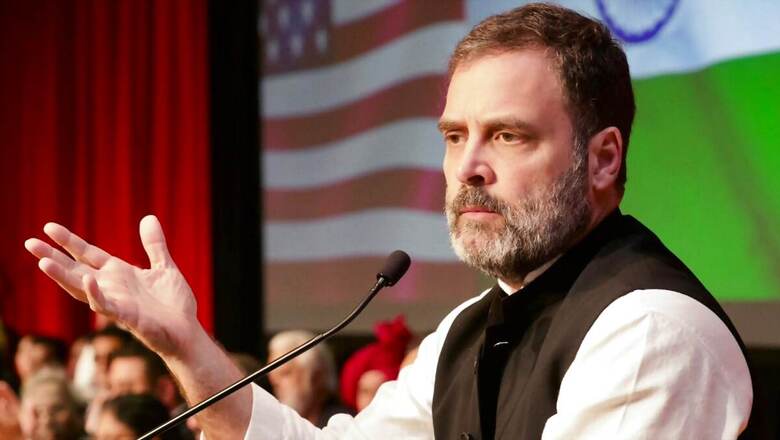
views
Congress leader Rahul Gandhi, during his visit to the United States last week, termed the Indian Union Muslim League (IUML) a ‘secular’ party. IUML is known for its conservative brand of religious politics. The party is an ally of the Congress in Kerala. IUML is opposed to co-education, had lobbied against the Shah Bano judgment of the Supreme Court, and has consistently advocated Sharia Law for Muslims in India.
The IUML has its roots in the erstwhile Muslim League which was responsible for India’s partition. The present-day IUML is a registered political party with the Election Commission.
“There is nothing non-secular about IUML,” Rahul Gandhi said. The Congress leader’s comments sparked off a debate in India. The BJP latched on to the statement, attacking the Congress for its ‘appeasement’ politics. In television debates, classic what-aboutery unfolded where each political party reminded another of their faulty moral turpitude and historical political opportunism.
At the heart of this debate is the perplexing question of ‘secularism’ in India. The meaning of this term, its scope, its limitations, and its ‘real’ meaning continue to be debated in India.
‘Secularism’ is nowhere defined in the Indian Constitution. The term was introduced into the Preamble by the 42nd amendment in 1976, though one cannot argue that India was non-secular before this insertion. While there is relative clarity on the constitutional or legal definition of secularism in Indian jurisprudence, the political definition is indeed a tricky slope.
Political secularism is dubious fallacy designed to protect and propagate power structures. Political secularism derives its existence from the cultural secularism in India, but also distorts it to trim away the politically unwanted and uncomfortable.
Cultural secularism thrives and survives despite the troubled history between the Hindu and Muslim community. Baba Vishwanath’s temple in Kashi would echo with the shehnai of Bharat Ratna Ustad Bismillah Khan despite the history of destruction from Islamic invaders. Cultural secularism in India has always appreciated the nuances, understood the difference between the invaders and the countrymen. Political secularism would deny the history of destruction and selectively celebrate the unique cultural identity of India. The truth is whole and not piecemeal.
In Indian politics, some would call hosting iftar parties as ‘secular’, while visiting temples can be ‘communal’. Political alignment with the religious conservative of the minorities can be ‘secular’ or even progressive in a twisted way. Nowhere in the world has secularism been so politically abused as it is in India. Political opportunism, necessities of power decide what is politically secular in India.
Despite political buffoonery, there is fascinating evolution of secularism in India that few countries or democracies can boast of, both legally and culturally. Without going into too many examples, let’s turn to the case of the Supreme Court of India which has fiercely guarded the Indian Constitution, its values, and its spirit.
The court is termed as one of the most powerful courts in the world and is the final arbiter of Indian Constitution. The apex court derives its motto from the Bhagvad Gita — Yato Dharmastato Jayah, which translates to ‘where there is truth, there is victory’. Independent India has increasingly shed off the colonial baggage where being secular meant distancing yourself from your religion completely.
The secularism of India is not without its culture and roots. The pale, cold, icy definition that the British liked and superimposed in India was for the survival of the British empire. The strict separation of religion and state as envisaged in the British era was purely a means for the Empire and its survival. Such definition is devoid of any history and context in Indian subcontinent. In fact, religion has been the key tool for framing laws and governance in India.
Before Independence, the British could not declare Hinduism or Islam as the state religion. Though England had an established state religion in Christianity, the colonisers could not guzzle Christianity on Indian subjects neither could they afford to prefer Islam over Hinduism or vice versa. They adopted the policy of iron wall between the state and the religion.
The first copy of the Indian Constitution has images of Ram and Sita, Begum Razia Sultan, and various other religious and cultural figures. The Indian state, since its inception, is not about disowning our culture and identity. But Indian politics took a strange turn where the conservative within the minority were not just politically protected but were also termed to be ‘secular’.
Secularism has a progressive facet to it. It involves looking beyond religious dogmas and appreciates human bonds. The most conservative of the religious ideologies are constitutionally protected, but to call them ‘secular’ is to defeat the constitutional evolution and mainstream the regressive and orthodox.




















Comments
0 comment